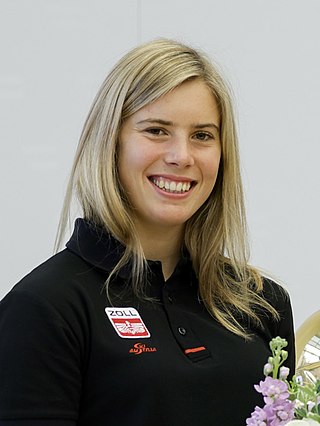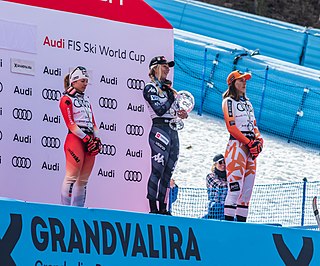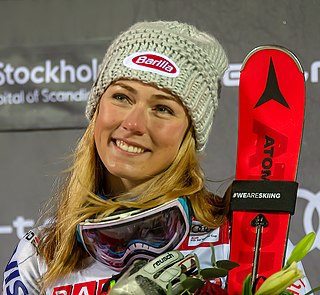
The 47th World Cup season began on 27 October 2012, in Sölden, Austria, and concluded on 17 March 2013, at the World Cup finals in Lenzerheide, Switzerland. The overall titles were won by Marcel Hirscher of Austria and Tina Maze of Slovenia.

Mikaela Pauline Shiffrin is an American World Cup alpine skier who has the most World Cup wins of any alpine skier in history and is considered one of the greatest alpine skiers of all time. She is a two-time Olympic Gold Medalist. She is a five-time Overall World Cup champion, a four-time world champion in slalom and a seven-time winner of the World Cup discipline title in that event. Shiffrin is the youngest slalom champion in Olympic alpine skiing history, at 18 years and 345 days.

Petra Vlhová is a Slovak World Cup alpine ski racer who specialises in the technical events of slalom and giant slalom. Vlhová won the World Cup overall title in 2021 and the gold medal in the 2022 Winter Olympics in the slalom event, becoming the first Slovak skier to achieve these feats.

The women's slalom in the 2021 FIS Alpine Skiing World Cup consisted of 9 events, as planned.

The women's slalom in the 2020 Alpine Skiing World Cup involved 6 events, although there were 9 originally scheduled.

The women's parallel competition in the 2020 FIS Alpine Skiing World Cup was contested as a World Cup discipline separate from slalom for the first time in 2020. Prior to the season, FIS decided to combine parallel skiing events into a new discipline, joining the existing disciplines of downhill, super-G, giant slalom, slalom, and Alpine combined. The discipline winner would receive a small crystal globe, similar to the other disciplines. However, at the same time, FIS decided to drop the city events to reduce the amount of travel required during the World Cup season, planning to replace them with more parallel events at regular venues.

The women's overall in the 2020 FIS Alpine Skiing World Cup involved 30 events in 6 disciplines: downhill (DH), Super-G (SG), giant slalom (GS), slalom (SL), Alpine combined (AC), and parallel (PAR). This was the first year that parallel was treated as a separate discipline; prior to the 2019–20 season, it had been a sub-element of the slalom discipline. The season had originally been scheduled to have 41 races, but 11 races that had originally been scheduled were canceled during the season, mostly due to the COVID-19 pandemic, as discussed below.

The women's giant slalom World Cup 2021/2022 consisted of 9 events including the final. Overall World Cup leader Mikaela Shiffrin from the United States, who started out in the early lead in this discipline, contracted COVID-19 at the end of 2021 and missed the post-Christmas giant slalom, then Shiffrin lost the lead in this discipline to Sara Hector of Sweden in the first race in 2022.

The women's overall in the 2022 FIS Alpine Skiing World Cup consisted of 37 events in 5 disciplines: downhill (DH), Super-G (SG), giant slalom (GS), slalom (SL), and parallel (PAR). The sixth discipline, Alpine combined (AC), had all of its events in the 2021–22 season cancelled due to the continuing schedule disruption cased by the COVID-19 pandemic, which also happened in 2020-21. In an adjustment that was partially motivated by the pandemic, each of the four main disciplines had nine races, while the parallel discipline had only one. The season did not have any cancellations.

The men's overall in the 2023 FIS Alpine Skiing World Cup consisted of 38 events in four disciplines: downhill (DH), super-G (SG), giant slalom (GS), and slalom (SL). The fifth and sixth disciplines in FIS ski events, parallel (PAR). and Alpine combined (AC), had all events in the 2022–23 season cancelled, either due to the schedule disruption cased by the COVID-19 pandemic (AC) or due to bad weather (PAR). The original calendar contained 43 events, but in addition to the parallel, four downhills were cancelled over the course of the season.

The women's giant slalom in the 2023 FIS Alpine Skiing World Cup included ten events, including the final. The season was scheduled to open in Sölden, Austria on 22 October 2022, but the race was cancelled due to bad weather and rescheduled to Semmering, Austria on 27 December.

The women's overall competition in the 2023 FIS Alpine Skiing World Cup consisted of 38 events in four disciplines: downhill (DH), super-G (SG), giant slalom (GS), and slalom (SL). The fifth and sixth disciplines, parallel (PAR). and Alpine combined (AC), had all events in the 2022–23 season cancelled, either due to the schedule disruption cased by the COVID-19 pandemic (AC) or due to bad weather (PAR). The original schedule called for 42 races, but in addition to the parallel, two downhills and a super-G were cancelled during the season.

The women's super-G in the 2019 FIS Alpine Skiing World Cup involved 6 events, including the finals in Soldeu, Andorra. Originally, the season had been planned to hold 8 events, but the two races scheduled in Sochi, Russia were cancelled due to continuing heavy snowfall.

The women's giant slalom in the 2019 FIS Alpine Skiing World Cup involved 8 events.

The women's slalom in the 2019 FIS Alpine Skiing World Cup involved 12 events, including three parallel slaloms. At the end of the season, a new discipline was created for parallel races.

The women's overall in the 2018 FIS Alpine Skiing World Cup involved 38 events in 5 disciplines: downhill (DH), Super-G (SG), giant slalom (GS), slalom (SL) [which included parallel slaloms and city events], and Alpine combined (AC).

The women's overall in the 2017 FIS Alpine Skiing World Cup involved 37 events in 5 disciplines: downhill (DH), Super-G (SG), giant slalom (GS), slalom (SL) [which included one city event], and Alpine combined (AC) [which included one super-combined]. A city event is a slalom conducted on a two-lane artificial ramp erected in a city; a super-combined consists of a downhill followed by a one-run slalom, as opposed to an Alpine combined, which consist of a Super-G followed by a one-run slalom.

The Women's Combined in the 2017 FIS Alpine Skiing World Cup involved three events, first a super-combined, and then two Alpine combined. Downhill champion Ilka Štuhec of Slovenia won the super-combined and held on to win the season championship. Interestingly, in only her second race in the combined discipline ever, overall World Cup champion Mikaela Shiffrin won the final race.












